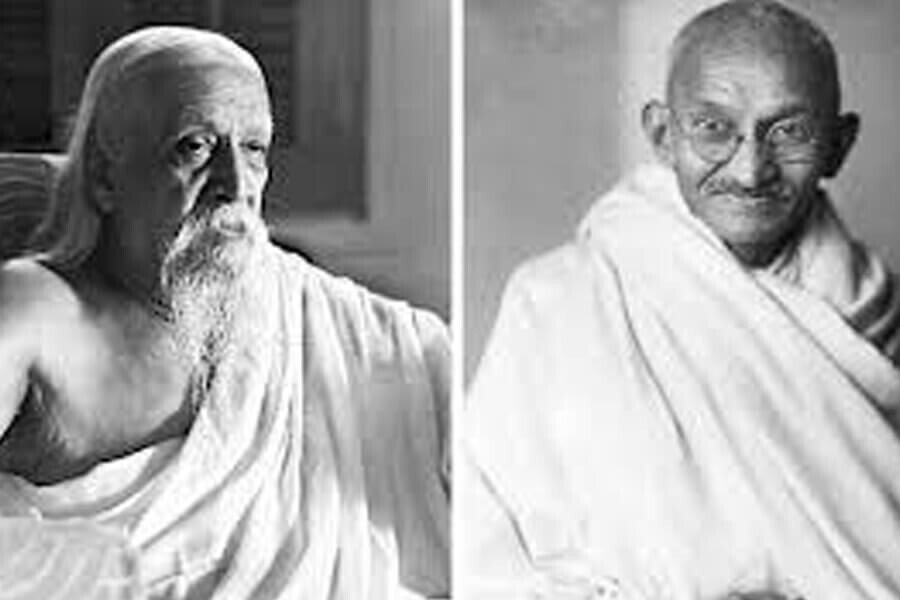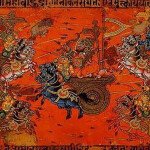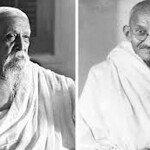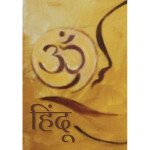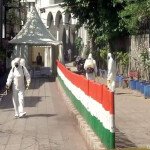Nation and Modernity from Mahatma Gandhi to Narendra Modi (With Special Reference to a Lesser-known Speech by Sri Aurobindo)
by Makarand R. Paranjape
Still Seeking Svaraj
From Mahatma Gandhi to Narendra Modi, Indian democracy, despite its various drawbacks and failures, is somewhat of a political marvel. Here is where the notion of svaraj may serve as a useful lens through which we can measure its achievements. We can start by asking whether Indian democracy really embodies the ideal of svaraj, so eloquently enunciated by several leaders of the freedom struggle including Lokmanya Tilak, Dadabhai Naoroji, Sri Aurobindo, and Mahatma Gandhi. In fact, svaraj is not a contemporary, but age-old Vedic idea, going back to ancient times.
Though we have completed seventy-two years of independence, it is obvious that the struggle for svaraj is far from over. To me, the central purpose of understanding our svaraj parampara or tradition of autonomy is to bring us closer to understanding what freedom, independence, and democracy really mean. That is because svaraj is more than political independence it is the reassessment and reassertion of our civilizational genius.
To achieve this, we must try to overhaul our entire intellectual infrastructure, for which we need nothing less than a new vocabulary of self-understanding. Such an overhauling would mean, at the least, the realignment of our intellectual enterprise with what we have truly sought and valued for millennia--the pursuit of self-knowledge, truth, virtue, beauty, and, of course, happiness--and the organisation of our material resources in such a way that our daily life conduces to these aims. In the previous sections we saw how this orientation was provided by our pursharthas, the cardinal aims of life—Dharma, Artha, Kama, and, ultimately, Moksha.
But in our attempts to regain our parampara, merely substituting Western ideas by half-understood Indian ones will not do. These languages of Indian selfhood are almost as colonized as Indian English is. Therefore, sprinkling some Indian words into our thinking process will not suffice. Just as language chauvinism is not the answer to our language-problems, conceptual chauvinism will not serve to liberate us either. We need to change our minds. This fundamental transformation is far more crucial than the superficial changes that are usually advocated by language, religion, or cultural nationalists.
Once we understand that svaraj is the issue, we see parampara not in dialectical opposition with its Other, adhunikata (modernity), nor is Bharatiyata (Indianness) a mere opposition to Pashyatikarana (Westernisation). Parampara, instead, is whole, integral, not just fragmentary or antithetical. Not a knee-jerk reaction to the domination of Western categories over Indian ones, but a deep understanding of the difference will take us forward. This can be done, as we have seen, by opening a [1]
What is Svaraj?
Svaraj is a very old Vedic word, but comes into the vocabulary of modern India in the nineteenth century. Some say Dayanand Saraswati’s Satyarth Prakash (1875) contains its first modern usage, but I have not been able to find it. Dayanand quotes the Vedic ‘ यःस्वयं राजते स स्वराट् ’, but does not apply it to political independence from Britain. The earliest modern use is probably in Sakharam Ganesh Deuskar’s pamphlet “Shivajir Mahattva” (1902), republished two years later as “Shivajir Diksha.” Deuskar was a friend of Sri Aurobindo, who also began to use the word. In a few years, with the struggle for freedom acquiring momentum especially because of Lord Curzon’s partition of Bengal in 1905, it became the most evocative and popular of indigenous words for political freedom, whether purna or total, or partial within the British Empire.
Several important political leaders like Bal Gangadhar Tilak, Dadabhai Naoroji, and Aurobindo used the word, as did Gandhi, who also adopted the word, making it a household mantra in Hind Swaraj (1909). The latter is not only one of his most important books, but also a comprehensive statement of the aims and methods of non-violent revolution. In the discourse of the freedom movement, though svaraj mostly signifies political autonomy, Gandhi meant much more by it. Perhaps, he and others were intuitively aware with its etymology, though they did not explicitly explain it.
Actually svaraj is an adaptation and shortening of the Sanskrit word svarajya, which is an abstract noun. The word is a compound of sva + raj sva means self and raj, means to shine (the etymology being raj deepnoti ). Hence the word means both the shining of the self and the self that shines. The root raj gives us many words associated with power including Raja, Rex and Regina.
The symbology of light is very important in the Vedas because it suggests the sun of higher consciousness – tat savitur verenyam, as in the Gayatri mantra. It is to that sun, savitur, that Aurobindo refers in his great poem, Savitri. So svarat is a self-luminous person, and svarajya is a state of being svarat or enlightened. We might actually say that svaraj is a very ancient word for enlightenment, the power and illumination that come from the mastery of the self. When applied to a single individual, its form is svarat, an adjective. It is a word that occurs many times in the Rg, Sama, and Yajur Vedas, as it does later in the Ramayana and the Mahabharata. In the Upanishads, it can be found in the Chandogya, Taitteriya, and Maitri.
It is in India that political independence came to be expressed even in modern times in so radically spiritual a manner in terms of enlightenment and self-illumination, not merely political power or independence. Opposing the colonizers and imperialists was thus the external aspect of svarajya the internal aspect was to have a good, just, and beautiful state, an enlightened social order. Svarajya is therefore the principle that aspires for better self-management, more effective inner governmentality, because illumination comes from internal order, not oppression. Originally, svrajya refered to the inner management of a person’s powers and capacities, of the senses, organs and of all the different constituents of the person. When these were well-governed, the person too would be all-powerful. For Gandhi, the homology between the individual body and the body politic was a useful metaphor if not a self-evident truth.[2]
Synonymous with liberty, freedom and independence, svaraj thus suggests a host of possibilities for inner illumination and self-realization. The word svaraj is preferable to decolonization because svaraj is not anti- anyone else. One’s own svaraj can only help others and contribute to the svaraj of others. In svaraj the personal and the political merge, one leading to the other, the other leading back to the one. I cannot be free unless all my brothers and sisters are free and they cannot be free unless I am free. Svaraj allows us to resist oppression without hatred and violent opposition. To fight for svaraj, Gandhi developed the praxis of satyagraha or insistence on truth or truth-force for the rights of the disarmed and impoverished people of India.
Svaraj thus means self-restraint, forbearance, refusal to rule over others. One of the clichés about India is that no matter how powerful the country was, it did not send expeditions of conquerors to countries outside the peninsula, huge armies to conquer, colonize, and bring back pelf from overseas expeditions. This is how the Arabs, Mongols, Turks, Persians, Afghans, Portuguese, British, Dutch, French and the others behaved, coming to India to conquer or plunder, but there is no record of Indian armies doing the same in other lands. The historical record of India does not show a desire to go and rule other people, to enforce its will on them, to trample them, to exploit them economically, to oppress them, to crush them – that is not, it would seem, the Indian way. But, by the same token, to be ruled by others is also unacceptable to the Indian spirit Indians, too, like other self-respecting peoples, have fought against it.
Throughout Indian history, the struggle for svaraj has gone on, often unrecorded. We have innumerable instances of villagers protesting against emperors, blocking roads, refusing to pay taxes, fasting and so on. The Vijayanagara Empire fought for svaraj, as did Chattrapati Shivaji. In the 150 years of British rule, there was a revolt practically every single year in India. Some part or the other was always up in arms against British rule. So Pax Brittanica was a great illusion. How could there be lasting peace without svaraj?
While svaraj has an inbuilt anti-imperialistic orientation, it also evokes a culturalist-nationalist position in which one’s civilizational heritage is owned up, even embraced, rather than discarded. It that sense, it suggests not a Western type of universalism, but a colourful cosmopolitanism, rooted in a radically different notion of ‘self’. But there is nothing ‘communal’ or fanatical about this project. That is why I believe that Gandhi took great pains to emphasize that svaraj is not a form of narrow nationalism or jingoism. Instead, it is a special, cooperative and pluralistic way of being in the world.
If debates on globalization, sovereignty and culture, are ultimately, debates about which way we want India to go, it is clear that both modernity and post-modernity represent paths which we should not fully accept. At best, they provide convenient points of entry to the real questions that shape our lives. Because these paths have made inroads into our own life and consciousness, they must to be examined, understood, possibly appreciated from a distance, but ultimately negated or incorporated into the broader quest for svaraj.
Sri Aurobindo’s Idea of Svaraj
On 24 January 1908, almost two years before Gandhiji wrote his seminal treatise Hind Swaraj on his way back from England to South Africa aboard S.S. Kildonen Castle, Sri Aurobindo made a speech in Nashik, Maharashtra. It is not one of his famous or well-known orations because it is not available in its original English. It was translated into Marathi and published the following morning in a Marathi paper, Nasik Vritta . We know of it because the Bombay Presidency Police retranslated into English in their Intelligence Abstract. It was first published by Archives and Research, a biannual journal published by Sri Aurobindo Ashram, in the first number of its first volume (April 1977) and subsequently included as Part 5 of Sri Aurobindo’s Political Speeches and Writing, 1890-1908, in his Collected Works.
Sri Aurodindo elaborates on the meaning of svaraj in this speech. Interestingly, he spends the first minutes disclaiming any oratorical skills as well as having anything to say for himself or on his own: “whatever I do is not done by me of my own accord. My actions are dictated by God. … I have hitherto been a writer and not an orator, but circumstances forced me to try my hand at oratory.”
He next defines the goal of the national struggle, which hitherto had been somewhat vague, but suddenly, “either by a stroke of fortune or by divine inspiration,” has acquired new clarity and urgency. The goal was defined by “the old patriot” in his Presidential Address at the Calcutta Congress in 1906: “We do not ask any favours. We want only justice. Instead of going into any further divisions or details of our rights as British citizens, the whole matter can be comprised in one word — ‘Self-government’ or Swaraj like that of the United Kingdom or the Colonies.” Sri Aurobindo quotes the same speech from memory in a slightly different way, “We must have Swaraj on the lines granted to Canada and Australia, which is our sole aim.”
According to Sri Aurobindo, if India’s forget about svaraj, they will go extinct: “If we do not acquaint ourselves with the object in view, viz., Swaraj, I am afraid we, thirty crores of people, will become extinct.” He reminds his listeners that it is people of Maharashtra that kept the torch of svaraj burning even during the darkest night. It is after this that Sri Aurobindo’s speech rises to a new level, not onl of eloquence but of spiritual inspiration, “Swaraj is life, it is nectar and salvation. Swaraj in a nation is the breath of life. Without breath of life a man is dead. So also without Swaraj a nation is dead. Swaraj being the life of a nation it is essential for it.”
Those nations, not matter how great and glorious they may have been in the past, come to grief when they forget svaraj. Sri Aurobindo refers to the ancient Roman empire, comparing it with the British empire: “In ancient times the Romans had extended their sovereignty over many countries as England has done at present…. Their lives and properties were all secure as ours are, but in spite of all this, it was said that the people under the sway of the Roman Empire came to grief with its downfall, and were harassed by savage people. The reason is, they had no Swaraj. After a lapse of centuries they stood on their own legs and established for themselves Swaraj and became happy.”
But those who aspire for it, must realise that svaraj is to be “gained by our own exertions. If it is gained otherwise, which is impossible, it cannot last long for want of strength in us.” Imploring the sovereign won’t do because “he won’t give it.” Sri Aurobindo sarcastically refers to the moderates who think that prayer, petition, and protest will win us svaraj. “Unfortunately there still exists a party of men who still cling to the idea that we shall obtain Swaraj by asking for it, which is to be regretted. This party thinks that we are not capable of managing our own affairs, that we are being trained in that direction and that our benign English Government will extend Swaraj to us by degrees.” Sri Aurobindo argues to the contrary, “The English value the importance of India. Its possession gives them status. If they once allow India to slip from their grasp, they will become a nonentity. Under such circumstances it is silly to say that the English will train us and entrust us with Swaraj. By reposing confidence in the English people we are already reduced to a miserable condition and in the end will become extinct.” [3]
Then he considers a second way to attain svaraj: “Another way of obtaining Swaraj is to seek aid from a neighbouring nation. But this means jumping from the frying-pan into the fire. No matter from whom we seek assistance their own interests will first be considered.” Later, when Subhas Chandra Bose wanted the help, first of Germany, then of Japan to win India’s independence, Sri Aurobindo opposed this method. The Sri Aurobindo Ashram, which in those days not only had many admirers of Bose, but also several others who sympathised with Germany because it was fighting Britian, were disappointed. Sri Aurobindo even asked them to leave the ashram if they didn’t agree with his view that Hitler had to be opposed at all costs, even if it meant temporary siding with the Allies. Now, Sri Aurobindo comes to the the third way, one which Gandhiji also advocated: “We should, therefore, acquire it by our own efforts.” No other way would work we had to fight for our own svaraj.
But the question remained: “how we should do it. We do not possess Swaraj nor have we the power to retain it. The answer is, we cannot master the art of swimming unless we struggle in the water. We should, therefore, be prepared to undergo hardships in the struggle for Swaraj, as there is no other alternative.” Here, all ways seem to be open, whether non-violent, violent, or some combination of them. Sri Aurobindo does not spell this out in this speech, but this is what we can glean from his other writings. Here he speaks of faith in God “God created us independent” therefore “we should be full of inspirations. With full faith in God we should preach independence through the length and breadth of the country and a beginning should be made to impart national education.” The importance he places on “national education” is unmistakable. If in addition to education, Indians can “take into their own hands judicial and executive work … we shall have more than half of Swaraj in our hands.”
Sri Aurobindo believes that the Bengalis who struggled for svaraj by defying British colonial authority, “do not fear fine, incarceration, deportation or the extreme penalty of the law…. If a Bengali lad is punished in connection with the Swadeshi movement, he smiles and says it does not matter much.” He urges Maharashtrians to follow suit: “O inhabitants of Maharashtra, since you and Bengalis are stirring to attain one end and as we are all sons of Aryabhumi, let us all jointly set ourselves to the task of bringing about a state of things in accordance with the commandment of God. We, Bengalis, depend upon you because the sons of Maharashtra were brave soldiers a short while ago. You enjoyed Swaraj when you were harassed by Mahomedans.” He reminds his audience of Tukaram, Ramdas, and of Shivaji, the warrior king who established svaraj in Mahatrashtra. Under Shivaji, “The poor were rescued from molestation by the wicked and the country prospered.” In the present state, he urges all to heed to the “divine inspiration,” to the “the commandment of God.” He wants Indians to unify “from the Himalayas to Kanyakumari.” He concludes by proclaiming, “If we, imbued with this idea, become united with a firm resolution to obey the commandment of God, I feel sure we shall gain our Swaraj in twenty years. It won’t take centuries….”
In retrieving and reconsidering this little-known speech of Sri Aurobindo our attempt has been to place him in his rightful place at the heart of India’s svaraj parampara.
Svaraj in Today’s Context
Narendra Modi’s elevation to the post of India’s Prime Minister in 2014, I have argued in several of my writings, marks a watershed for India. His winning again, with an even more impressive count of 303 in the 2019 general elections definitely signifies the end of the Nehruvian socialist, secularist consensus that prevailed almost as a state religion in India for some six decades of independent India. It was this combination of developmental nationalism and inclusive Hindutva which proved to be the winning ideology that swept Modi and the BJP to power a second time.
To my mind, Narendra Modi has understood the idea of svaraj better than his predecessors and is therefore the best instrument to confirm and fulfil the prophecy of rising India. Under Modi, India has progressed more, in the real sense of the word, in five years than possibly in the whole of its previous six decades. This great transformation cannot, of course, be measured merely in economic terms, although the figures indicate that our growth rates are among the highest and the inflation certainly the lowest since independence.
In addition, access to government services and schemes, whether Jandhan, Ujjwala, Saubhagya, Swachh Bharat, etc., has been unprecedented. A clean government led by a charismatic and strong Prime Minister with ministers and officials who deliver have redressed the trust deficit between the citizenry and the ruling elites. The concomitant rise of India on the world stage, thanks to the Modi doctrine, has led to a quantum leap in the respect accorded to India. Furthermore, improvement of both national security on the borders and reduction in crime, lawlessness, and violence on the home front suggest an era of peace and stability. Last but not the least, a new pride in our identity, culture and heritage, especially for the Hindu majority, have ended the self-loathing and civilizational inferiority complex which have plagued us for centuries.
Modi earned his mandate and popularity by delivering on good governance and development. Moreover, after the 2019 verdict, the signalling so far has not been belligerent or triumphalist Hindu nationalism, but inclusive Hindutva. The new government has also tried to reach out to all sections of the populace, not just Hindus, with special schemes for their education, upliftment and the safeguarding of their rights. To me therefore, the new nationalism that Modi 2.0 represents is svaraj in its manifold dimensions.
Today svaraj means the augmentation of India’s hard power through military prowess, economic empowerment, and determined diplomacy on the one hand, combined with Soumya Shakti, the soft power of culture, spirituality, yoga, cuisine, couture, and so on, on the other hand. Together they add up to nothing less than India’s rejuvenation, renewal, and rise. This may sound hyperbolic or over enthusiastic. But the mood of the nation is certainly upbeat.
1. I deliberately spell the word as svaraj, not only because that is closer to its pronounciation in Sanskrit and other Indian languages, but because I think we must all reflect on its meaning and make it our own. Swaraj, the older spelling and form of the world in English is used while quoting the earlier writers on it. Portions of this essay have appeared in my earlier writings. Dialogue between Bharatiya parampara and Western modernity so as to create new spaces of knowledge and svaraj.↑
2. See C. Mackenzie Brown’s ‘Svaraj, the Indian Ideal of Freedom: A Political or Religious Concept?’↑
3. Dadabhai Naoroji’s Speeches and Writings (Madras: Natesan, 1917), p. 76.↑


